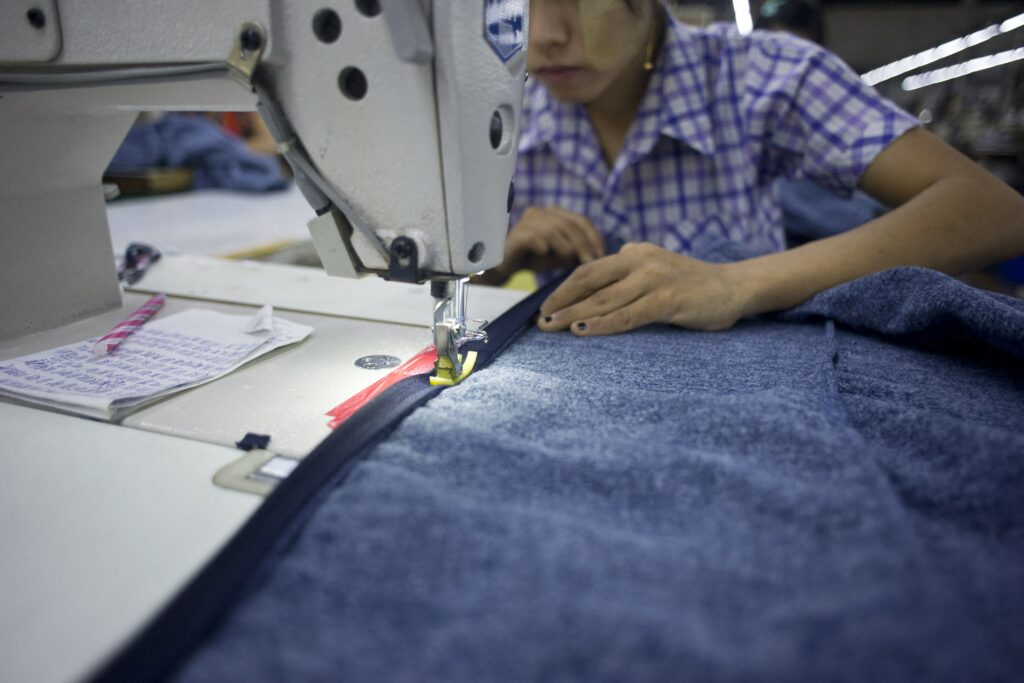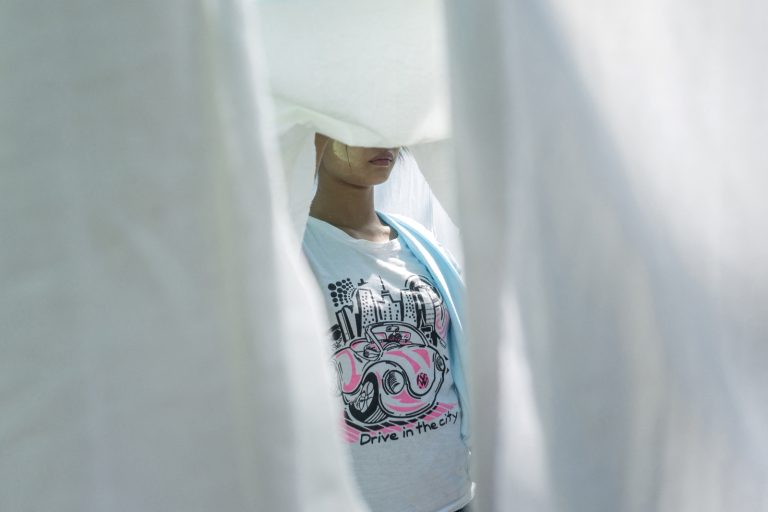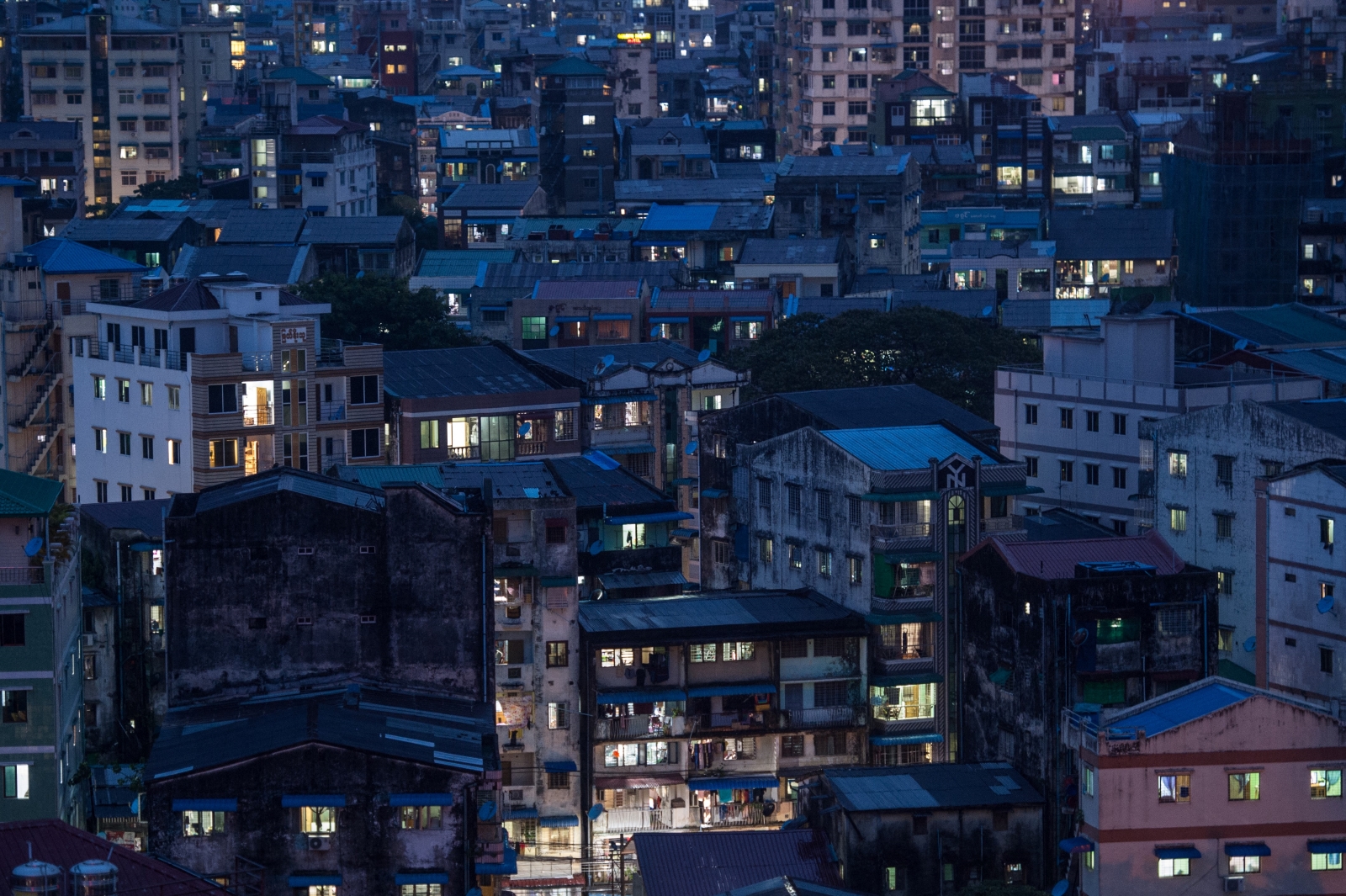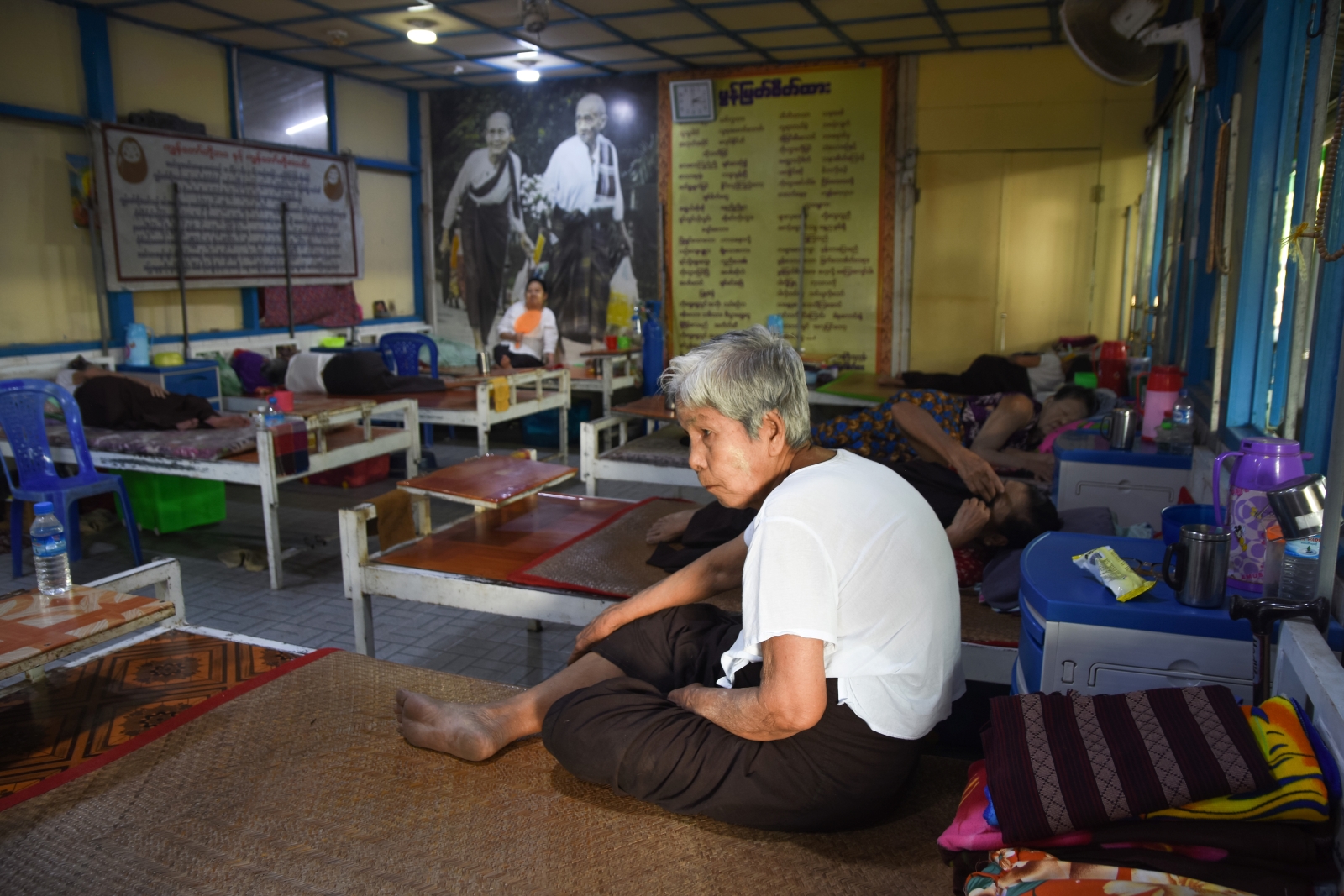Conditions continue to worsen for Myanmar’s garment workers, some of whom are forced to work punishing hours in unlicenced, often nameless factories that allegedly supply major global brands.
By RACHEL MOON | FRONTIER
Badly paid and exhausted after not a single day off in a month, Ma Theint Theint Win* would love nothing more than to quit her garment factory job.
“If I could, I wouldn’t set foot in this factory again,” said the 27-year-old Yangon resident, whose dream is to study Japanese and leave Myanmar. At the very least, she would like to be able to spend Sundays with family and friends.
But her bosses at the Jiangsu Soho garment factory in Shwepyithar Township refuse any time off for workers until they meet company targets.
“If I refuse to work Sundays, the supervisors will abuse me,” she said, explaining that meeting targets brings a small bonus. Missing targets, however, means salaries are cut, including those of the supervisors, who then take their rage out on the workers, often by verbally abusing them.
“The wages just aren’t worth all our efforts. I want to go and work in Japan. I want to learn their language. I’m looking for another factory job here so I can rest on Sunday, but it’s not easy to find these days,” she said.
Under Myanmar labour law, Sunday is a factory rest day and double wages must be paid for those working, but few regulations are being enforced under the military regime that seized power in February 2021.
Meanwhile, when holidays are observed, they are often mandatory and out of sync with the Myanmar festival calendar, and come with drastically reduced pay.
Ma Wah Lwin*, a worker at Sinoproud Garments, complained that her factory closed for 17 days during Chinese New Year in January and paid her only K1,800 a day. This is less than US$1 at the official rate and far below the minimum wage of K4,800, which is required by law for long-term closures.
“For all of January I earned only about K100,000,” Wah Lwin told Frontier. She added that she earns around K250,000 ($120) in months without major holidays, but that this is down from the K300,000-400,000 she made each month before the coup.
The factory has also cut its labour force, driving remaining workers to exhaustion. “A production line that used to have 50 workers now has 30. It’s so stressful but there’s no way we can complain,” she said.
Both women said their only recourse is to quit, but they can’t do so until they find another job to support their families. Frontier tried to contact both factories, but no one answered their phones.
‘Nameless factories’ on the rise
Myanmar’s garment industry was once lauded as a success story. In the decade prior to the 2021 military coup, exports of apparel, footwear and handbags increased more than 500 percent to $6.7 billion in 2019. However, the sector has since been rocked by the twin disasters of the COVID-19 pandemic and the coup.
The Myanmar Garment Manufacturers Association says that as of September last year, the garment industry had lost more than a quarter of its labour force compared to 2019, dropping from 700 factories employing 700,000 workers to 485 factories employing 453,000.
Those that remain in their jobs, however, suffer similar exploitation to Theint Theint Win and Wah Lwin. Moreover, with the breakdown of already-creaky dispute resolution mechanisms between workers, bosses and the labour ministry, and the banning of more outspoken trade unions, these workers have few means of pushing back against abuses.
Some of these abuses are taking place in so-called “nameless factories” – unlicenced workshops that seem to be sub-contracted by official suppliers to international clothing brands.
Ma Zin Mar Win* was fired from a bag factory in Yangon’s industrial hub of Hlaing Tharyar last year when the company cut its labour force. After desperately searching for a new job for two months, the 29-year-old was hired to sew clothes at another factory through a connection of her old supervisor.
She asked the supervisor the name of the new factory but was told it was just a small home business with no name. Zin Mar Win was therefore surprised when she showed up on her first day of work to a fully-fledged factory with over 100 workers.
“How can a small business have over 100 workers? Eventually, I found out it’s just a factory without a licence,” she said. “The owner has a good relationship with the authorities. It’s a factory subcontracted by another, official factory.”
Zin Mar Win said she’s paid the legal minimum wage of K4,800 per hour and gets compensated for overtime work, but some of the conditions are harsh and blatantly illegal.
“There are so many orders, and we are forced to meet high targets in a short time. We aren’t allowed to go to the toilet and have to eat our lunch in 10 minutes,” she said.
The Cooperation Committee of Trade Unions, one of several labour organisations to be declared illegal after the coup, said many nameless factories have opened in industrial zones over the past year, where workers are more vulnerable to abuse because they can’t even identify their employers in a complaint.
Ma Kyawt Thu Khaing*, 25, says she also works at a garment factory in Hlaing Tharyar with no apparent name and she doesn’t even know the nationality of its owner.
“I got a job here through a friend. No one knows its name, so we call it the nameless factory. My wages are at least one third less than at the previous factory I worked for, and the workload is more,” she said.
She said there are over 100 workers and they sew items for various global brands, including Zara.
Daw Khaing Zar Aung, president of another outlawed group, the Industrial Workers’ Federation of Myanmar, told Frontier that according to complaints from workers, multiple nameless factories are making products for Inditex, the Spanish multinational that owns Zara. But she said when IWFM contacted implicated foreign brands, they disclaimed responsibility and said that their suppliers denied using subcontractors.
“There is no factory name, but the workers are sewing for big brands… Of course, the suppliers are lying, but it’s very hard to investigate nameless factory cases,” said Khaing Zar Aung,
Inditex did not respond to Frontier’s request for comment.
Ms Margreet Vrieling, associate director of Netherlands-based Fair Wear Foundation, called the new development “profoundly worrying”.
“Not knowing the name of the factory makes it harder for workers to file their grievances and, in turn, impossible for brands to start investigating, let alone apply pressure to improve working conditions,” she said.
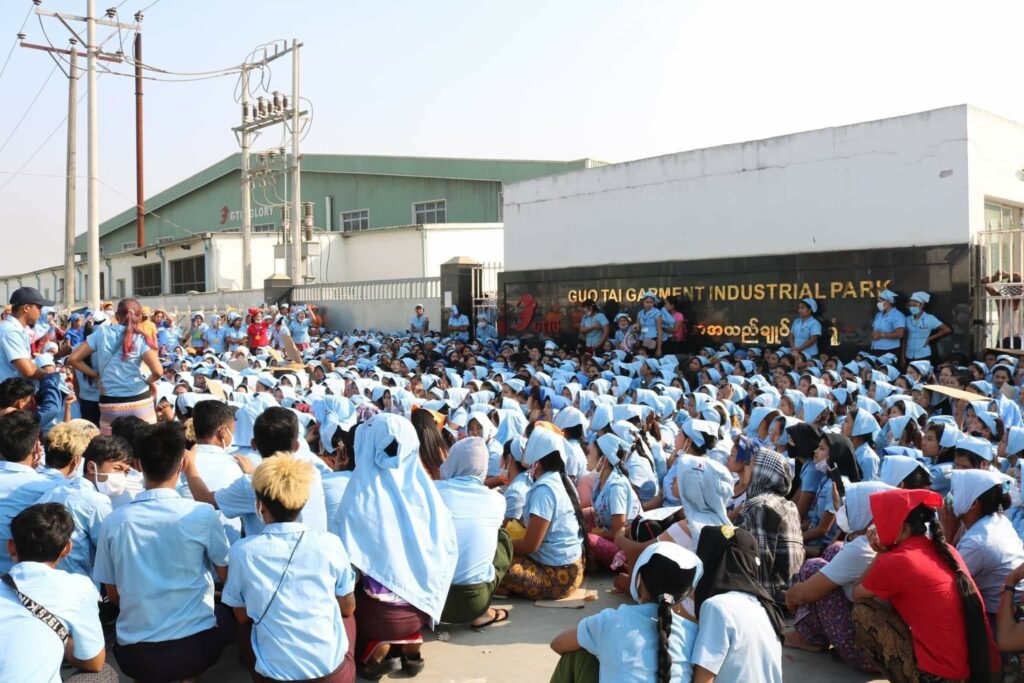
But even in licenced factories, cases of workers taking factory owners to court are rare as few receive justice through the junta-controlled legal system.
Ma Ei Popo Hlaing, a former worker at Yangon Fukurama Apparel factory, is trying nonetheless. She has sued the factory owner, a Chinese citizen, alleging she was fired in breach of her contract. Four hearings have been held, but the owner has never showed up in court, meaning the trial cannot proceed.
Ma Ei Popo Hlaing has been assisted by the Solidarity Trade Union of Myanmar, whose members still operate unofficially despite the group being outlawed shortly after the coup. Senior STUM member Ko Zin Wai Aung told Frontier the worker was fired because she took three days of sick leave over three months.
“She was sick. This is unfair dismissal. She wanted to continue working there but the factory refused to take her back, so she filed a lawsuit against the owner,” he said.
Before the coup, workers could reclaim wages for sick leave by having HR submit applications at the government’s social security office, which paid back the wages. But to stop workers from taking leave, STUM director Daw Myo Myo Aye said factories now make them submit their own claims, which is impossible without first being given leave by the factory.
Yangon Fukurama Apparel representatives said the owner had returned to China, so Zin Wai Aung’s next step is to try to bring the case against the factory itself or the manager.
“Frankly speaking, I have no faith in the labour law. No matter how many rights we have on paper for workers, the law is not equal,” says Myo Myo Aye. “When the law is manipulated by people with power and money, the workers always suffer. So, it’s better if workers don’t go to court.”
To boycott or not
Despite shutdowns and lay-offs, and possibly due to the mass erosion of labour rights, garment exports appear to be increasing again. The manufacturers’ association says exports generated over $4.7 billion in the first 11 months of the 2022-2023 financial year, which ended on March 31, after earning $2.2 billion in the financial half-year from October 2021 to March 2022.
Dr Khin Khin Kyi, a senior MGMA member who owns the Quality Apparel factory in Yangon’s North Okkalapa Township, told Frontier her factory had full orders until August.
“Most garment orders still come from Europe, Japan and the United States. Myanmar is known for its low wages, so I think buyers can’t resist it,” she said,
A manager of a shoe factory owned by a Chinese national in Hlaing Tharyar said bluntly that businesses were also benefitting from the absence of strikes under the oppressive conditions of military rule.
“In the past, if workers went on strike once, the buyer would reduce their order by about 20pc. Buyers have no confidence if there’s no stability. Owners say work is going better after the coup,” she said, asking to remain anonymous.
But the National Unity Government, a parallel administration set up by lawmakers ousted by the coup, warns bosses not to be so complacent. U Kyaw Ni, the NUG’s deputy labour minister, says employers who violate labour rights will be seriously punished by the government “after the revolution”.
“We know that workers are forced to work overtime without pay like slaves, and are unfairly fired. To these selfish entrepreneurs, we want to say that they will have to pay back for their crimes when the revolution succeeds,” he said.
However, complicity extends beyond supplier factories and spans the world.
IWFM, which has called for comprehensive economic sanctions against the junta, investigated 147 cases where factories had allegedly violated labour laws last year and determined that 80pc of them were owned by Chinese nationals. But the West was implicated too – the factories made clothing for brands from 18 countries, 10 of which are in the European Union.
The Ethical Trading Initiative, an independent United Kingdom-based group, concluded last year that foreign brands were unable to protect Myanmar workers in their supply chains from human rights abuses.
“Brands will find it nearly impossible to conduct normal human rights due diligence,” ETI said, calling for companies to “reassess their presence” in Myanmar but stopping short of demanding they pull out. It said if they did leave, they “must do so responsibly” after assessing “the impact of exiting Myanmar on workers and their families”, given an estimated 320,000 workers would lose their jobs or face reduced income if all European buyers exited.
IWFM president Khaing Zar Aung, however, says foreign brands should simply stop buying from Myanmar.
“Brands cannot do business in a country where they cannot implement their rules. That is why we ask them to leave… If they don’t stop sourcing from Myanmar, it is the brands themselves who are infringing human rights,” she said.
But whatever their longer-term impacts, brand pull-outs can lead to immediate job losses. After Irish company Primark announced its exit from Myanmar last year, two Chinese-owned supply factories abruptly closed, leaving over 2,200 employees without work.
Myo Myo Aye of STUM said workers at the two factories were informed just two weeks in advance, rather than the one month’s notice required by law, and were not adequately compensated.
“When owners want to close a factory, they don’t follow rules and laws. They fire the workers first with meaningless reasons,” she said. “[Primark] said they respect human rights, so they stopped investing in Myanmar. But labour rights are also human rights. If they really respect labour rights, they need to take every step to make a responsible exit.”
Primark did not respond to questions from Frontier but news reports quoted the Irish company as saying it would ensure that the fired workers receive all unpaid wages and severance payments owed.
UK retail giant Marks & Spencer also announced that it would make a “responsible exit” from Myanmar by the end of March in the wake of the ETI report.
Ma Chaw Nge*, a 35-year-old worker at a garment factory in Shwepyithar, declined to comment on the calls for brands to pull out of Myanmar, saying she has no time for politics.
“What I can say is I don’t want to be jobless. Even if the work conditions are bad, at least we can get a monthly salary. There are a lot of mouths I have to feed,” she said.
Chaw Nge and her husband have three children and look after two elderly relatives. Her husband was a construction worker before the pandemic, but now brings in much less money as a motorcycle taxi driver.
“He struggles to bring in even K5,000 a day,” she said, adding that it’s a risky job given many resistance attacks in urban areas are conducted on motorbikes, making drivers a target for arbitrary arrest and killings by security forces.
Chaw Nge said although working conditions are much worse than before the coup, unemployment would bring greater hardship.
“I also don’t like working under this military government,” she said. “But I don’t want to lose my job, because it would be difficult to find a new job if all the factories shut down. We wouldn’t be able to survive.”
*indicates the use of a pseudonym for security reasons


